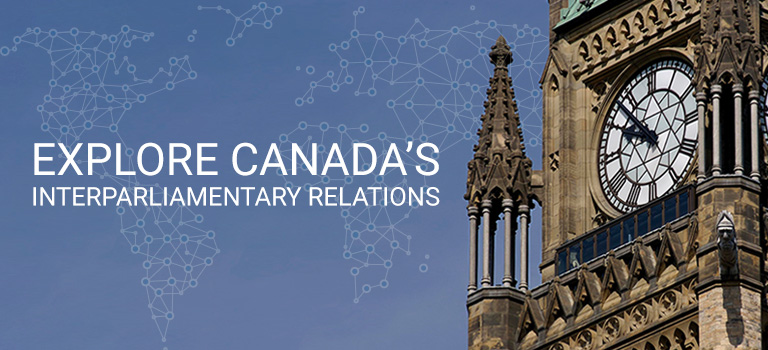Interparliamentary Activities and Reports
Refine your search
Results: 641 - 650 of 3096
October 13 - 14, 2021
Seminar France-Quebec on Women Parliamentarism in France and Quebec
By videoconference
Canadian Branch of the "Assemblée parlementaire de la Francophonie" (CAPF)
On 13 and 14 October 2021, the Canadian Branch of the Assemblée parlementaire de la Francophonie (APF), represented by Marie-France Lalonde, Member of Parliament, participated in “Le parlementarisme féminin en France et au Québec : où en sommes-nous?”, a symposium about women in parliament in France and Quebec hosted by the Commission de la mémoire franco-québécoise.
The symposium was chaired by Pauline Marois, who was the Premier of Quebec from 2012 to 2014. This event provided a historical overview of women’s right to vote and a look at the representation of women in Quebec’s National Assembly, the French Senate and France’s National Assembly. Speakers also addressed topics such as the under-representation of women in electoral politics in both France and Quebec and the importance of gender parity within parliaments.
October 12, 2021
Bureau Meeting of the APF
By videoconference
Canadian Branch of the "Assemblée parlementaire de la Francophonie" (CAPF)
The Plenary Assembly of the Assemblée Parlementaire de la Francophonie (APF) delegates authority to the Bureau to oversee the execution of its decisions. The Bureau is responsible for implementing the Plenary Assembly’s motions, resolutions, opinions and recommendations and may make any decision that will be helpful in that regard. Based on reports from the Secretariat General, it considers issues concerning the admission of branches and changes to their status, and it adopts the APF’s budget.
Francis Drouin, MP, Chair of the Canadian Branch and First Vice President of the APF; Chris d’Entremont, Vice-Chair of the Canadian Branch; and Joël Godin, MP and Chair of the APF Parliamentary Affairs Committee, attended the meeting virtually. Mr. Drouin also chaired the meeting.
Several activity reports were tabled, including the activity report from the APF Parliamentary Secretary General, and the cooperation programs were reviewed. The Treasurer’s report on the accounts for 2020 was also considered, along with the review of the political situation throughout the Francophony.
Joël Godin, Chair of the APF Parliamentary Affairs Committee, spoke about the order of priority for certain APF projects and its budgetary management. Francis Drouin presented a proposed partnership with the Réseau francophone d’éthique et de déontologie parlementaires, as well as the recipient of the Geoffrey Dieudonné award.
Lastly, the chairs of the various committees and networks presented the results of their deliberations. Heads of mission of the various APF regions also provided an update on their respective activities.
October 6, 2021
Meeting of the APF Cooperation and Development Committee
By videoconference
Canadian Branch of the "Assemblée parlementaire de la Francophonie" (CAPF)
The Honourable Éric Forest, Senator, participated in the meeting of the Assemblée parlementaire de la Francophonie’s (APF) Cooperation and Development Committee by videoconference on 6 October 2021. Senator Forest proposed that a new project be developed on the impact of climate change on island, coastal and waterfront territories in francophone areas. The Committee approved this proposal.
The Committee also discussed the economic situation in La Francophonie. Senator Forest pointed out that the COVID-19 pandemic has had a disproportionate economic impact on some population groups in Canada, such as women. The Committee also adopted a resolution on rural land use and vitality, and it discussed matters involving climate change and sustainable development in the context of COVID-19, as well as international trade negotiations carried out within the framework of the World Trade Organization.
October 4, 2021
13th Gathering of ParlAmericas Gender Equality Network (plenary session)
By videoconference
Canadian Section of ParlAmericas (CPAM)
September 28 - 30, 2021
First Global Parliamentary Meeting on Achieving the SDGs
By videoconference
Canadian Group of the Inter-Parliamentary Union (UIPU)
From September 28 to 30, 2021, the Hon. Marilou McPhedran and the Hon. Kim Pate, Senators and members of the Canadian Group of the Inter-Parliamentary Union (UIPU), attended the First Global Parliamentary Meeting on Achieving the Sustainable Development Goals (SDGs). During this event jointly organized by the Inter-Parliamentary Union (IPU) and the Indonesian House of Representatives, participants had the opportunity to discuss the role of parliamentarians in ensuring the realization of the SDGs by 2030. Several issues were addressed, including climate change, a fair and inclusive recovery to the COVID-19 pandemic, a fair and equal distribution of COVID-19 vaccines globally, international cooperation, the needs of vulnerable populations, global inequalities, and universal health coverage.
Senator McPhedran spoke about how the COVID-19 pandemic has reduced our chances of achieving the SDGs on schedule. She explained that missing these targets will cost us more over the long-term; as such, she argued, the world must invest in sustainable development today. She noted that the Organisation for Economic Co-operation and Development is warning that financing for sustainable development is at risk of collapsing. Senator McPhedran highlighted that Canada is pursuing innovation in social finance by mobilizing private capital for the public good to enhance its progress on the SDGs.
An outcome document summarizing the meeting is available on the IPU’s website
September 28, 2021
OSCE Parliamentary Assembly Follow-up meeting with Young Political Leaders
By videoconference
Canadian Delegation to the Organization for Security and Co-operation in Europe Parliamentary Assembly (SECO)
September 27 - 30, 2021
Executive Committee Meeting (EXCO)
By videoconference
Canadian Branch of the Commonwealth Parliamentary Association (CCOM)
The Canadian Branch was represented by the Hon. Yuen Pau Woo, Senator.
September 24, 2021
57th Meeting of the Board of Directors of ParlAmericas
By videoconference
Canadian Section of ParlAmericas (CPAM)
Results: 641 - 650 of 3096 — Page: 65 of 310


